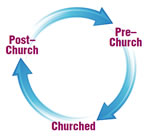by Dr. Robert D. Newton
 |
|
Photo: istockimages |
Imagine trying to drive in Chicago with a street map of San Francisco. You probably can’t. While both cities are edged by water and have lots of tall buildings, they are nothing alike. Though they share names for several streets, trying to drive in the one with the map of the other would prove frustrating. No matter how hard you tried, you simply wouldn’t get anywhere. Confused and exasperated, you’d finally conclude: It’s time to change maps!
As God’s missionary people, we also need to change maps in order to navigate in this present day. Changes in our society and culture, especially regarding the Church, have come fast and furiously. It’s as if we went to bed one night only to wake up the next morning in a vastly different world. Once vibrant and growing churches question whether they will remain open for another year. Many pastors and people feel guilty for not reaching their communities with the Gospel, while well-intentioned mission sermons often leave them discouraged, even defensive. And in their defensiveness, they begin to reason that faithfulness has only to do with preserving the true faith, whether or not that faith is proclaimed to the nations.
Mission work requires faithfulness. As Lutheran Christians, we are acutely aware of the need to be faithful at a time when secularism and religious pluralism assault the Church on every side. While striving to be faithful, however, many find themselves unable to connect their communities with the Gospel. Along with faithfulness we need wisdom— wisdom to understand the time and contexts into which Christ has called us to serve as His missionary people.
The Context
 All mission contexts boil down to three: Pre-Church, Churched, and Post-Church. Pre-Church refers to a context in which the Church has not been established; so the culture is wholly unchurched. The Churched context finds the Church firmly established in the community and culture. The Post-Church context finds the Church’s significance in the community waning. These contexts move from one to the next in a circular rather than linear fashion, as the following diagram suggests.
All mission contexts boil down to three: Pre-Church, Churched, and Post-Church. Pre-Church refers to a context in which the Church has not been established; so the culture is wholly unchurched. The Churched context finds the Church firmly established in the community and culture. The Post-Church context finds the Church’s significance in the community waning. These contexts move from one to the next in a circular rather than linear fashion, as the following diagram suggests.
Churches, like other social organisms, exist in relationship to a larger society defined by cultural boundaries that clearly mark those who are members (insiders) from those who are not (outsiders). Insiders are careful to maintain their boundaries, recognizing that any penetration by something (or someone) foreign may harm the community. The key difference between cultural insiders and outsiders is how they view these boundaries: Insiders work at protecting them; outsiders work at penetrating them.
In any given context, Christians live and serve either as cultural insiders or outsiders. Knowing which one we are is as critical to mission work as using the right map is to navigation. Consider the following questions:
- Who can speak with credibility regarding spiritual issues?
- When do these conversations take place
- Where do they take place?
- What is the starting place for these conversations?
Each of these questions is indispensible to Gospel proclamation. Critical to their consideration is understanding that they can be answered only by cultural insiders. Knowing which one we are in each mission context— insider or outsider—tells us whether we (or someone else) must provide the answers.
Pre-Church Contexts
Missionaries serving in a Pre-Church context must assume the role of cultural outsiders, recognizing that non-Christians are cultural insiders. Non-Christians, then, must answer the who, when, where, and what questions. Christian witnesses cannot assume that they will be trusted or credible just because they are Christians. Furthermore, they must adapt their ministry to meet the unchurched when and where the unchurched meet.
Finally, and most important, they do not determine the starting place of the conversation. The unchurched insiders do. The missionary begins with their questions or concerns and carefully, lovingly moves from there to the Good News of Jesus. Through these means, the missionary penetrates the boundaries of the unchurched culture and the Gospel starts to work on the inside.
 |
|
Photo courtesy LCMS |
Critical to penetrating the culture is to become “permeable,” that is, to diminish as many “foreign” or outsider elements as possible. Thus, missionaries learn the language and culture of the unchurched insiders. They get involved in the life of the community, getting to know and be known by them. They recognize that it may take some time before they are considered credible enough to have something worthwhile to say about life issues, especially spiritual matters. Missionaries begin, then, as learners (students) of the insiders’ world.
Over time, they operate as traders, exchanging or comparing their understanding of issues with those of the insiders. Eventually they may be invited to speak authoritatively about life and faith issues as contributors. Missionaries know that they have become trusted contributors when insiders confide to them the brokenness of their world and their inability to restore things to what they know is right (the law of God written on their hearts).
Missionaries need to recognize that they might never become cultural insiders. Cultural insiders, therefore, must play a critical role in communicating the Gospel. Proclamation depends more upon those we would call “laity” (especially the newly baptized) than on the missionary. The Holy Spirit also raises up various gifts (people) from among the insiders’ community through whom He speaks His Word both to the unchurched and to those being gathered by the Word (Ephesians 4).
Christians in a Pre-Church context focus primarily on unchurched people hearing the Good News. So they stay highly engaged with the unchurched, maintaining a porous boundary between themselves and the unchurched. Rather than creating their own place where they can invite their friends and relatives to hear about Jesus, they go to where (and when) the unchurched naturally gather. There they listen and apply God’s Word to the needs and questions the unchurched are raising. Eventually, a number of people gather around God’s Word, and a church is born. As more and more people become Christian, the Church increases in cultural and social significance, often replacing the unchurched community as the new insiders.
The Churched Context
Almost every dynamic of churched and unchurched people described in the Pre-Church context reverses in the Churched context. Christians are now the cultural insiders, and the unchurched the outsiders. The Church has become an essential part of the community, central to—even shaping—the shared history of the community. As such, it enjoys significant credibility, wielding considerable influence in the larger society. Consider the Christian church’s role in Europe or early America in shaping the languages and cultures of much of the Western world. (For example, modern German was built substantially on Luther’s translation of the Scriptures; J. S. Bach’s influence on classical music remains to this day.)
As insiders, the Church now answers the who, when, where, and what questions of Gospel communication. Who speaks with authority and credibility? Our pastor does. When and where do we discuss spiritual matters? We come to church. What is the starting place for our conversation? We naturally consider questions important to Christians, using language and theological categories developed within the Church—e.g., as Lutherans, we often ask questions among ourselves that are more theological than practical in nature, concerning ourselves with true doctrine, proper distinction between Law and Gospel, and theological matters that distinguish us from other Christian churches.
 |
|
Photo: istockimages |
As cultural outsiders, the unchurched tend to gravitate toward the Church. They share the Church-influenced language and culture, support the cultural values established by the Church, and appreciate the Church’s role in society. Desiring to be cultural insiders, they willingly go through whatever process the Church requires to gain membership. They become permeable, willing to learn the language and culture of the Church. On the other hand, the Churched no longer focus on the unchurched; they’ve become virtually invisible. It’s generally assumed that almost everyone is a Christian. (How often have we heard, “America is a Christian nation”?)
In contrast to missionaries in a Pre-Churched society, pastors in a Churched society minister from the position of key cultural insiders, both in their churches and communities. Often highly educated, they are respected as spiritual and ethical leaders, trusted guardians of the community’s culture and values. Gospel proclamation belongs primarily, if not exclusively, to them. Evangelism occurs, therefore, by people inviting their unchurched friends and neighbors to come to church in order to hear what the pastor has to say. The several spiritual gifts operating in the Pre-Churched era atrophy or consolidate into one—the pastor/teacher.
As churches grow, more time and energy must be devoted to the needs and concerns of the members, which often means less attention is given to the unchurched. In order to serve the members, the churches increasingly invest in buildings and programs, multiplying ministries to the Churched. In an effort to protect their members from the dangers present in the non-Christian (or heterodox) world, they fix clear boundaries between those inside and outside their church. Over time the Church becomes preoccupied with its institutional needs while losing sight of those still outside the Kingdom.
The Post-Church Context
The Post-Church context is a complex combination of the previous two. In short: The larger community around the Church has become increasingly unchurched, more and more reflecting a Pre-Church context of ministry. At the same time, the Church continues to operate with the assumptions of the Churched society.
Simply speaking, both the churched and the unchurched claim the insider’s position, while viewing the other as alien. Because both view themselves as cultural insiders, neither has the need or inclination to become permeable in order to connect with the other. Instead, each tends to strengthen its own boundaries in an attempt to maintain its own identity, health, and future. Boundaries become all the more important as each feels threatened by the other.
The Post-Church context presents incredible challenges for local congregations, especially in regard to their Gospel outreach to the unchurched world.
First, they are caught off balance. Having for so long held the position of cultural insiders, they still build their outreach ministry on the assumptions and practices that worked in the Churched era—basically that the unchurched will be attracted to their church or ministries. They cannot understand why individuals and families find the soccer field, Starbucks, or just sleeping in more appealing than going to church on Sunday morning. Or why people challenge the traditional Christmas tree in the town square, or the Ten Commandments in a court of law. These cultural changes make no sense.
 |
|
Photo: istockimages |
Second, and more important, Christians and churches struggle to find ways to connect meaningfully with the unchurched. The struggle centers in large measure on the Church’s inability to take up the position of cultural outsider, that is, to become permeable in regard to its own boundaries in order to penetrate the boundaries surrounding the unchurched world. Such permeability seems inappropriate, or worse, unfaithful in light of our Lord’s call to His Church to remain true to Him (in the world but not of it). Intuitively, faithfulness seems to require the thickening and sharpening of the Church’s boundaries in order to protect itself and its confession from the assaults of secularism and religious pluralism.
So how do Christian churches become permeable—the posture of missionaries in a Pre-Churched world—and remain faithful? This is the million-dollar question facing every church desiring to follow Christ in a Post-Church world. Is it possible to surrender the boundaries (the protective walls) without losing the essential life and integrity of the faith? Our Lord thought so. As He looked to His own death, by which He would gather the nations to Himself, He told His disciples, “Truly, truly, I say to you, unless a grain of wheat falls into the earth and dies, it remains alone; but if it dies, it bears much fruit” (John 12:24 ESV). What has to die in the seed is not its essence, just its protective husk. Missionary permeability and doctrinal integrity are not biblically exclusive. However, from the New Testament until today, churches desirous to be faithful have struggled with meshing the two.
Consider St. James’ words to St. Paul in Acts 21: “You see, brother, how many thousands there are among the Jews of those who have believed. They are all zealous for the law, and they have been told about you that you teach all the Jews who are among the Gentiles to forsake Moses, telling them not to circumcise their children or to walk according to our customs.” St. Paul’s ability and requirement “for the sake of the Gospel” to “become all things to all people, that by all means I might save some” seemed to cause significant anxiety among the Judean believers (cultural insiders) that he was compromising the true doctrine as revealed through Moses in the Torah.
Confessional and missionary faithfulness require that we wrestle with these Gospel essentials in the light and for the sake of our Savior’s purpose in coming into our world.
About the Author: Dr. Robert D. Newton is president of the LCMS California-Nevada-Hawaii District.





